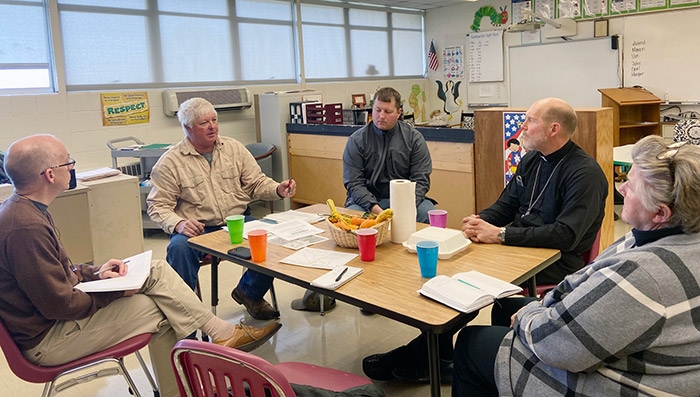
Bishop Thomas Zinkula listens as farmer Ray Menke talks about his concerns regarding the safety of a proposed CO2 pipeline that would run through Lee County, Iowa, including on his farm near West Point. Seated next to him (right) is farmer Dan Steffensmeier. Others listening are Lynne Devaney, diocesan superintendent of schools and Deacon Kent Ferris, diocesan director of Social Action. The meeting took place Nov. 22 at St. Vincent School in Keokuk.
By Barb Arland-Fye
The Catholic Messenger
KEOKUK — As St. Vincent School celebrated Grandparents Day, two farmers and diocesan leaders met in an empty classroom to talk about a proposed CO2 pipeline and concerns that it could pose safety hazards to the people of Lee County.
Farmers Ray Menke and Dan Steffensmeier of the West Point area laid out their concerns about the pipeline proposal Nov. 22 for Bishop Thomas Zinkula, Superintendent of Schools Lynne Devaney and Deacon Kent Ferris, diocesan Social Action director.
Menke owns a farm in the West Point area through which the proposed Heartland Greenway pipeline would pass. Steffensmeier farms with his family, whose property is also in the path of the proposed pipeline. Both men believe the pipeline — which would transport liquefied carbon dioxide — poses a safety hazard to their farms, Catholic and public schools, the fire department, city hall and especially people living in low-lying areas.
“I know my grandparents worked hard on this farm, my dad worked hard on this farm and I work hard on this farm and (the pipeline) is going to go a mile right through this farm and I don’t want anything to do with it.” The terrain is hilly, includes a dam and several tile lines, Menke said.
Based on a friend’s measurements, the pipeline would pass within 1,200 feet of the West Point Fire Department, 1,700 feet within West Point City Hall and a half-mile from Holy Trinity Catholic Elementary. In addition, three rivers flow through Lee County, where West Point is located.
Heartland Greenway pipeline would take “carbon dioxide emissions from 21 ethanol and fertilizer processors across five states and permanently store 15 million metric tons of carbon dioxide more than a mile underground in central Illinois every year,” reports WeAreIowa, a Des Moines-based news network. The pipeline would traverse 885 miles through Iowa from the northwest to the southeast and carry “tons of liquid carbon dioxide … a number that brings up safety and environmental concerns” (https://tinyurl.com/ bddxmpdu).
Navigator CO2 Ventures LLC, based in Omaha, Nebraska, is developing the Heartland Greenway project, one of three CO2 pipeline projects in development in Iowa. The other two are Summit Carbon Solutions LLC, based in Ames, Iowa, and Wolf Carbon Solutions, based in Denver, Colorado. Wolf Carbon Solutions is hosting a public meeting about its project Dec. 6 at 5:30 p.m. in the Davenport River Center.
Menke said Navigator CO2 altered the Heartland Greenway pipeline’s path in Lee County after people raised objections about the pipeline’s proximity to Central Lee Schools. However, the company has not confirmed that statement. Lee County encompasses 55.39 miles of the Heartland Greenway System.
The Lee County Board of Supervisors filed a formal objection to the Heartland Greenway Systems pipeline with the Iowa Utilities Board on June 6. The board wrote, in part, “The Board has listened to its private citizens and landowners and we agree that the construction of the pipeline not only disrupts the agricultural economy of Lee County, but we are concerned with the safety of our citizens in the event some unfortunate incident should occur.”
“We respectfully request that the Iowa Utilities Board consider the principles set forth in Iowa Code 6A.21. Portions of this code clearly demonstrate the protection of agricultural lands from private development. Unlike natural gas pipelines or fuel pipelines, CO2 pipelines serve no public purpose. The precedent set by granting of eminent domain to projects like this would mean eminent domain could be used for any number of projects for which it was never intended. Lee County strongly urges the Iowa Utilities Board to cautiously and carefully consider the nature and benefits when determining public convenience and necessity of the proposed pipeline.”
Menke said a county supervisor found through research that the pipeline would remove just 1/25th of 1% of carbon dioxide emissions in the atmosphere. Menke does not believe that is worth the risk.
In addition to safety concerns, he worries about the use of eminent domain by Navigator and other pipeline owners to obtain easements from landowners who decline the request. “The feeling out there is there’s nothing we can do. All we can do is try to protect the city of West Point and Holy Trinity Catholic School and St. Mary Church.”
Devaney noted the coincidence of some Catholic school leaders meeting that day in Fort Madison to talk about Gov. Kim Reynolds’ initiative to provide funding to ensure public and nonpublic schools’ safety. “What about outside sources affecting safety?,” Devaney asked, referring to the proposed pipeline.
Navigator CO2 Ventures describes the Heartland Greenway project as a “proposed carbon capture, utilization, and storage (CCUS) system that will provide biofuel producers and other industrial customers in five Midwest states with a long-term and cost-effective means to reduce their carbon footprint.” The project will “safely transport the captured CO2 over a newly built 1,300-mile pipeline network; and permanently sequester 10-15 million metric tons of CO2 into a safe and secure, underground sequestration site” (https://tinyurl.com/ 5axazzb9).
Menke is not convinced. A CO2 pipeline that ruptured near Sartartia, Mississippi, in 2020 released a cloud of CO2 over the community, resulting in the hospitalization of 49 people and evacuation of around 300 people, according to Mississippi News (https://tinyurl.com/
mw5bajvc).
In its findings, released this spring, the Pipeline and Hazardous Materials Safety Administration (PHMSA) determined that the Mississippi pipeline broke from heavy pressure caused by movement in the soil after persisting heavy rain. However, the federal agency also found that the owner, Denbury Inc., “had, among other errors, failed to prepare for such natural hazards, failed to alert local emergency officials about the incident, and failed to educate nearby residents about the pipeline before the breach,” Mississippi News reported. As a result, PHMSA announced it would begin new rulemaking to update safety standards.
Deacon Ferris believes CO2 pipelines ultimately affect all of the counties in the Diocese of Davenport. “I think people need to know what’s going on,” he said. “Catholic Social Teaching is not just about us, but our neighbors, too,” Bishop Zinkula said. “We can draw attention to this issue.”
Menke agreed with both diocesan leaders. “This isn’t just about landowners. It’s about everybody.” You’ve got low-lying areas near rivers and 18-inch pipelines running along the river basin. Those people need to be way more concerned than me.”
He urges all Iowans to learn more about the issue. One place to start: the Iowa Utilities Board (iub.iowa.gov). Check out the websites of the proposed CO2 pipeline projects
(heartlandgreenway. com, wolfcarbonsolutions. com and summitcarbonsolutions.com).











